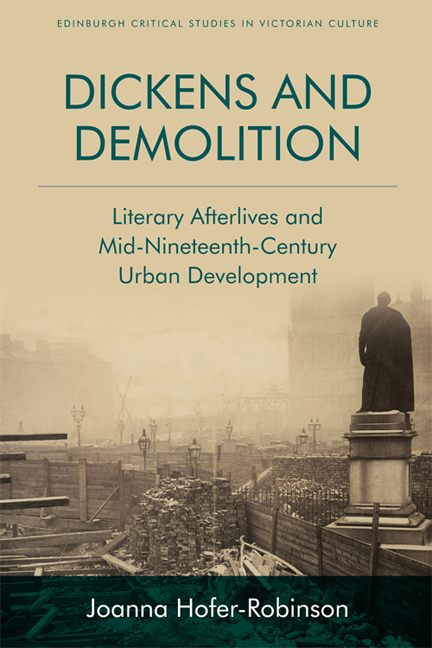Book contents
- Frontmatter
- Contents
- List of Illustration
- Acknowledgements
- Series Editor’s Preface
- Abbreviations and a Note on Editions
- Dedication
- Introduction
- 1 Charles Dickens and Metropolitan Improvements
- 2 Sets and the City: Staging London and Oliver Twist
- 3 Dickensian Afterlives and the Demolition of Field Lane
- 4 Paperwork and Philanthropy: Dickens’s Involvement in Metropolitan Improvement
- 5 From Sanit ary Reform to Cultural Memory: The Case of Jacob’s Island
- Coda
- Archival Sources and a Note on Method
- Select Bibliography
- Index
- Plate Section
4 - Paperwork and Philanthropy: Dickens’s Involvement in Metropolitan Improvement
Published online by Cambridge University Press: 29 April 2021
- Frontmatter
- Contents
- List of Illustration
- Acknowledgements
- Series Editor’s Preface
- Abbreviations and a Note on Editions
- Dedication
- Introduction
- 1 Charles Dickens and Metropolitan Improvements
- 2 Sets and the City: Staging London and Oliver Twist
- 3 Dickensian Afterlives and the Demolition of Field Lane
- 4 Paperwork and Philanthropy: Dickens’s Involvement in Metropolitan Improvement
- 5 From Sanit ary Reform to Cultural Memory: The Case of Jacob’s Island
- Coda
- Archival Sources and a Note on Method
- Select Bibliography
- Index
- Plate Section
Summary
The last chapter examined appropriations of Dickens's fiction by politicians and the press. Whether to support their own arguments or merely to enliven a dry speech, these users mobilised Dickensian afterlives to facilitate modes of communication that implicitly spoke for a larger group, journalists and politicians each being, in their way, supposedly answerable to the public. Moreover, as slum clearance was aligned with the amelioration of social and environmental problems, these Dickensian afterlives were used to argue that improvements would benefit the general populace, as well as specific communities or target districts. Dissenting voices always challenged these claims. Still, Dickens's works were valuable rhetorical tools through which such users spoke for, evoked or directly addressed a wider public. This chapter steps back from public arenas. Instead, it examines the roles that individuals could play in driving alterations to the built environment. Although practical building or reform projects were necessarily collaborative endeavours – requiring the participation of various tradesmen and financial backers, for instance – philanthropic initiatives prove that individuals could and did effect change.
I begin with Dickens himself. By investigating Dickens's personal involvement with a charitable scheme to improve London's provision of housing stock for the East End poor, this chapter suggests that he was directly involved with making changes to the built environment in his lifetime. Dickens's philanthropic works and interest in social and environmental reform have long been a subject of critical enquiry. For example, Patrick Brantlinger, Lauren Goodlad and Jenny Hartley have each examined intersections between Dickens's fiction and his advocacy of contemporary causes or practical reform projects, such as Urania Cottage. Meanwhile Sajni Mukherji, Louise Penner and Bruce Robbins, among others, have analysed Dickens's imaginative representations of charity and charitable individuals. This chapter adds to the research presented in these fine studies by framing his interests and activities in the context of his social network, which included important philanthropists and government reformers. It then considers how his administration of material projects instigated by these people affected how he conceived the utility of writing, and what kinds of texts could have an impact on society and the built environment.
Examination of Dickens's involvement with practical charitable projects provides another window on to how the circulation of texts overlapped with metropolitan improvements.
- Type
- Chapter
- Information
- Dickens and DemolitionLiterary Afterlives and Mid-Nineteenth Century Urban Development, pp. 130 - 172Publisher: Edinburgh University PressPrint publication year: 2018



